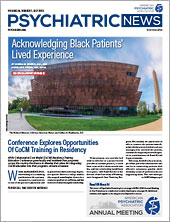In May, I traveled to San Francisco to attend APA’s Annual Meeting—psychiatry’s premier meeting of the year—and excited by the experience, I wrote this article a week after I returned home. It was my first meeting as a member of the Scientific Program Committee, and I took great pride in watching it unfold. I learned firsthand why it takes the committee hundreds of hours to plan an event that expands our knowledge of psychiatry and makes us better at doing what we love most—helping patients heal and working toward creating a mentally healthy nation for all. I also saw firsthand the extraordinary efforts and dedication of the staff to our mission.
However, despite the meeting’s success, it was held against the background of failure. The failure is not just my own but one I collectively share with other psychiatric physicians, the House of Medicine, elected and appointed public officials, and the general public. Our failure is accepting the unacceptable: A
2016 report from the Treatment Advocacy Center noted, “In 44 states, a jail or prison holds more mentally ill individuals than the largest remaining state psychiatric hospital.” Moreover, people with untreated serious mental illness comprise an estimated one-third of the total homeless population in the United States and an even higher percentage of women and individuals who are chronically homeless. The center also reported that people with untreated serious mental illness make up about a third of the total homeless population in the United States. We are so accustomed to hearing such statistics that they are accepted as the norm.
While psychiatrists have made strong efforts to understand and address the social determinants of mental health and advocate for housing-first programs, we have not made great strides to change the reality of many of our most vulnerable and severely ill patients.
Weeks before the Annual Meeting, I recalled reading an article about the closure of many retail stores reportedly secondary to an increase in crime near the site of the meeting—the Moscone Convention Center—and less foot traffic. As a Chicagoan, I am familiar with the changes in a once-thriving downtown community where one feels protected from the gun violence occurring just a few miles away and sheltered from the struggles of impoverished communities. While I was deeply saddened by the plight of the homeless individuals lying in doorways or on the street as I walked to the convention center, for of all us psychiatrists attending the meeting, I believe there were positive aspects to having to confront the realities that so many of our most severely ill patients constantly face.
Each day, I make an effort to make individuals like these feel seen. Saying hello, initiating a greeting, responding to a simple hello, and offering to purchase a meal are just some examples. I know these gestures are small and could easily be perceived as efforts by a privileged physician to ease guilt; however, for me, witnessing their struggles renews my motivation to advocate for change within APA and through legislative venues, and at the AMA as a member of APA’s delegation.
As the late Congressman John Lewis taught, we need to get in good trouble. As an organization and as individual physicians, we need to make strides to decrease the impact of the social determinants of mental health, develop a plan to improve health care within correctional facilities, address the stigma toward correctional psychiatrists, and partner with stakeholders to eliminate homelessness and the criminalization of mental illness. The time is past to make a change!
Walt Disney said, “The way to get started is to quit talking and begin doing.” What are you doing? And what will we do together? ■
Resources
APA urges you to become involved in advocacy, and staff in APA’s Division of Government Relations will work with you and provide you with helpful tools. For more information, email Ashley Mild of APA’s Division of Government Relations at
[email protected]. Keep up with APA’s advocacy work by signing up for APA’s Advocacy Alerts at
https://www.psychiatry.org/psychiatrists/advocacy.

